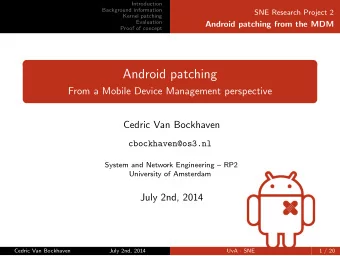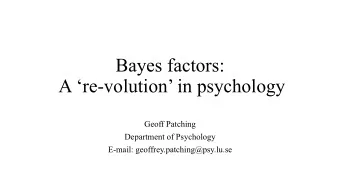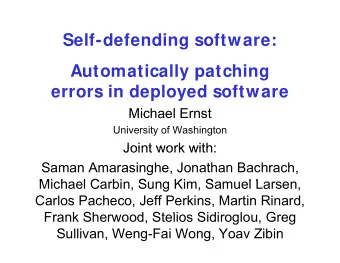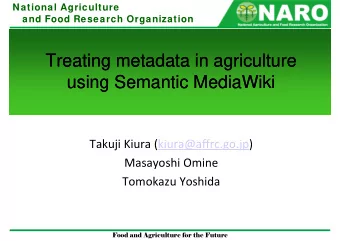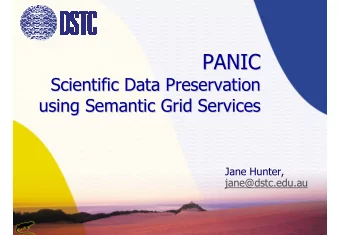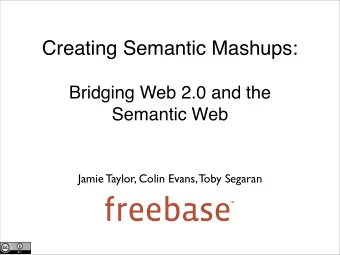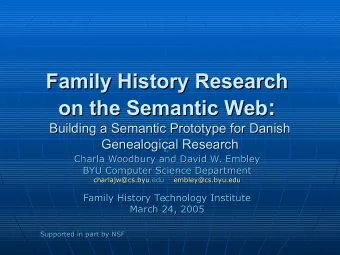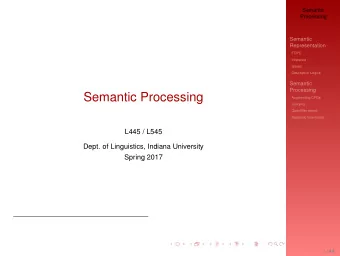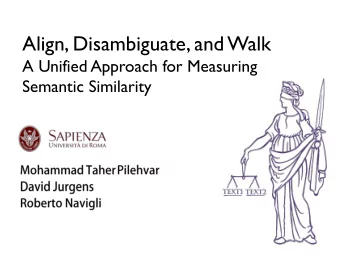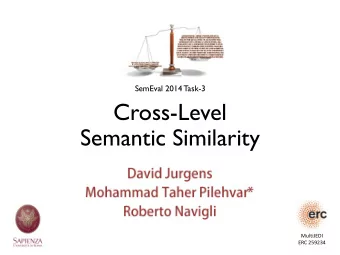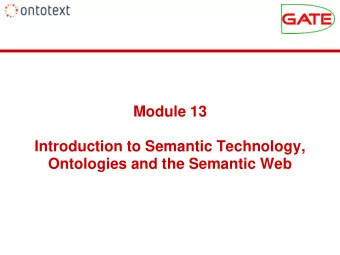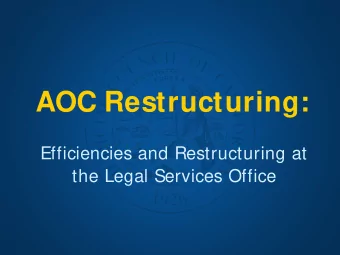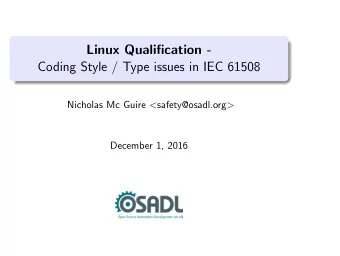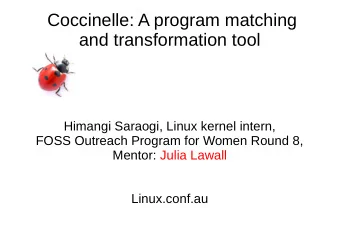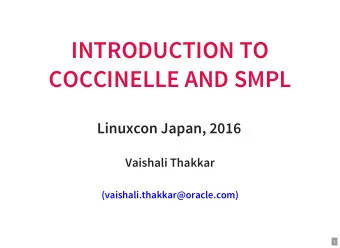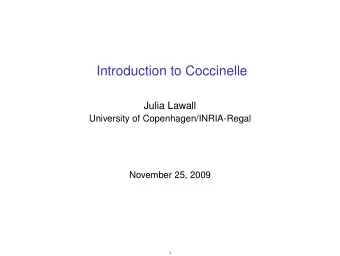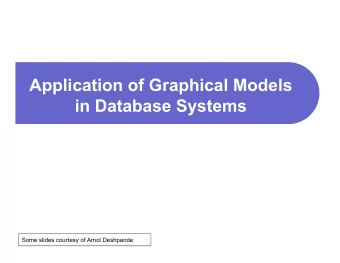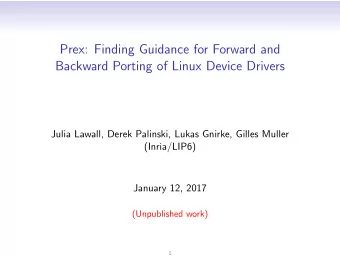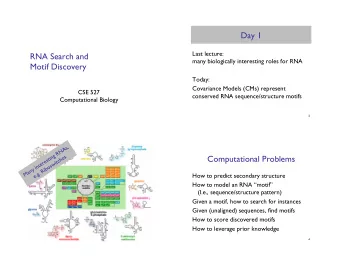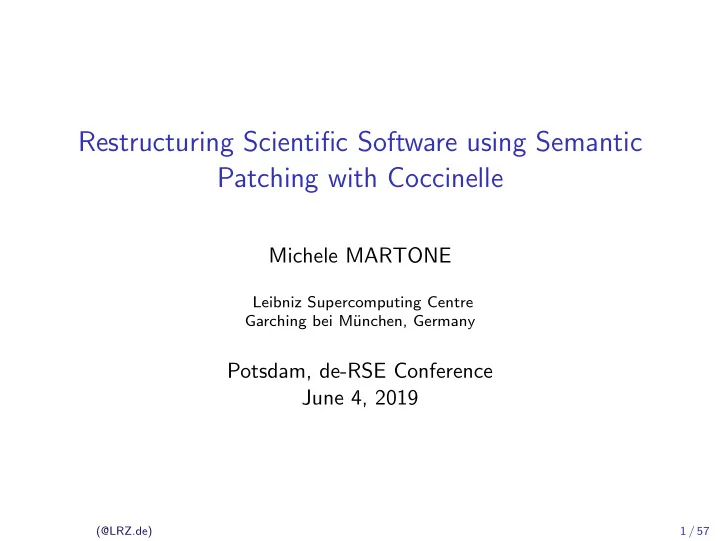
Restructuring Scientific Software using Semantic Patching with - PowerPoint PPT Presentation
Restructuring Scientific Software using Semantic Patching with Coccinelle Michele MARTONE Leibniz Supercomputing Centre Garching bei M unchen, Germany Potsdam, de-RSE Conference June 4, 2019 (@LRZ.de) 1 / 57 Description de-RSE@Potsdam,
Restructuring Scientific Software using Semantic Patching with Coccinelle Michele MARTONE Leibniz Supercomputing Centre Garching bei M¨ unchen, Germany Potsdam, de-RSE Conference June 4, 2019 (@LRZ.de) 1 / 57
Description de-RSE@Potsdam, 04–06.06.2019 workshop abstract Restructuring Scientific Software using Semantic Patching with Coc- cinelle 2019-06-04, 18:00–19:15, A31 West Maintenance of a large HPC software in C/C++ can be demanding. Factors like evolving 3rd-party APIs and hardware require significant efforts to project sustainability. Failure in coping with these challenges can lead to obsolescence, performance loss, vendor lock-in, bugs. This workshop introduces the ‘Coccinelle’ tool for semantics-aware matching and patching of C code. While initially conceived for automatically keeping up-to-date Linux kernel drivers, Coccinelle has been underexplored in other contexts. Here, emphasis will be given on code restructuring for High Perfor- mance Computing (HPC) codes in support to domain scientists. Coccinelle can also be a powerful testing tool. Discussion and experience exchange is welcome. https: // derse19. uni-jena. de/ derse19/ talk/ URQ7X3/ (@LRZ.de) 2 / 57
Description A word of caution Code optimization and Coccinelle ◮ Code optimization is tricky. Coccinelle can be tricky, too. ◮ This is NOT a talk to teach you optimization or Coccinelle. ◮ This is a talk about how optimizations might be implemented by means of Coccinelle’s rewrite rules . For code optimization courses, take a look elsewhere, e.g. ◮ https://www.lrz.de/services/compute/courses ◮ http://www.prace-ri.eu/ptcs For Coccinelle, one-day training: 08.10.2019 at LRZ: ◮ https://www.lrz.de/services/compute/courses/2019-10-08_ hspc1w19/ (@LRZ.de) 3 / 57
Description Motivation what is this all about ? ◮ automating (oh well: scripting ) code restructuring ◮ ...for HPC ◮ (but also for anything else) STOP! Why automate that ? Let’s see... (@LRZ.de) 4 / 57
Description Motivation which sequential access is faster ? 1 struct ptcl_t { 1 struct ptcla_t { double X, Y; double X[N],Y[N]; 2 2 double P; double P[N]; 3 3 4 }; 4 }; ... ... 5 5 6 struct ptcl_t aos[N]; 6 struct ptcla_t soa; 7 7 ... ... 8 8 for(i=0;i<N;++i) for(i=0;i<N;++i) 9 9 aos[i].P = soa.P[i] = 10 10 f(aos[i+1].X + f(soa.X[i+1] + 11 11 aos[i -1].X + soa.X[i-1] + 12 12 ... ); ...); Array of Structures? Structure of Arrays? (@LRZ.de) 5 / 57
Description Motivation which sequential access is faster ? 1 struct ptcl_t { 1 struct ptcla_t { double X, Y; double X[N],Y[N]; 2 2 double P; double P[N]; 3 3 4 }; 4 }; ... ... 5 5 6 struct ptcl_t aos[N]; 6 struct ptcla_t soa; 7 7 ... ... 8 8 for(i=0;i<N;++i) for(i=0;i<N;++i) 9 9 aos[i].P = soa.P[i] = 10 10 f(aos[i+1].X + f(soa.X[i+1] + 11 11 aos[i -1].X + soa.X[i-1] + 12 12 ... ); ...); Not AoS... ...SoA vectorizes better! (@LRZ.de) 5 / 57
Description Motivation A relevant motivating problem: GADGET simulation code ◮ Cosmological large-scale structure formation (galaxies and clusters) ◮ Highly scalable ( O (100 k ) Xeon cores on SuperMUC@LRZ) ◮ Several teams and versions ( > 100 kLoC each) (@LRZ.de) 6 / 57
Description Motivation A relevant motivating problem: GADGET simulation code ◮ Cosmological large-scale structure formation (galaxies and clusters) ◮ Highly scalable ( O (100 k ) Xeon cores on SuperMUC@LRZ) ◮ Several teams and versions ( > 100 kLoC each) Refactoring for node-level performance 1 struct particle { double Mass , Hsml , ...; 2 3 }; 4 5 ... 6 // Array of Structures 7 struct particle *P; 8 9 ... 10 // may not vectorize 11 P[i]. Mass + P[i]... (@LRZ.de) 6 / 57
Description Motivation A relevant motivating problem: GADGET simulation code ◮ Cosmological large-scale structure formation (galaxies and clusters) ◮ Highly scalable ( O (100 k ) Xeon cores on SuperMUC@LRZ) ◮ Several teams and versions ( > 100 kLoC each) Refactoring for node-level performance 1 struct particle { 1 struct particle_soa_t { double Mass , Hsml , ...; double *Mass , *Hsml , ...; 2 2 3 }; 3 }; 4 4 5 ... 5 ... ⇒ 6 // Array of Structures 6 // Structure of Arrays 7 struct particle *P; 7 struct particle_soa_t P_SoA; 8 8 9 ... 9 ... 10 // may not vectorize 10 // vectorizes better 11 P[i]. Mass + P[i]... 11 P_SoA.Mass[i] + P_SoA ... (@LRZ.de) 6 / 57
Description Motivation A relevant motivating problem: GADGET simulation code ◮ Cosmological large-scale structure formation (galaxies and clusters) ◮ Highly scalable ( O (100 k ) Xeon cores on SuperMUC@LRZ) ◮ Several teams and versions ( > 100 kLoC each) Refactoring for node-level performance 1 struct particle { 1 struct particle_soa_t { double Mass , Hsml , ...; double *Mass , *Hsml , ...; 2 2 3 }; 3 }; 4 4 5 ... 5 ... ⇒ 6 // Array of Structures 6 // Structure of Arrays 7 struct particle *P; 7 struct particle_soa_t P_SoA; 8 8 9 ... 9 ... 10 // may not vectorize 10 // vectorizes better 11 P[i]. Mass + P[i]... 11 P_SoA.Mass[i] + P_SoA ... How do you do this cleanly ? (@LRZ.de) 6 / 57
Intro Coccinelle ( http://coccinelle.lip6.fr ) Coccinelle “...a program matching and transformation engine ... for specifying desired matches and transformations in C code” source to source translation ◮ arbitrary transformations of C code refactoring ◮ making program structure easier to understand spotting bugs ◮ detect bad code patterns (e.g. spot missing free() ) (@LRZ.de) 7 / 57
Intro ... semantic patching with Coccinelle! “...engine for specifying desired matches and transformations in C code” (@LRZ.de) 8 / 57
Intro ... semantic patching with Coccinelle! “...engine for specifying desired matches and transformations in C code” Example AoS ⇒ SoA conversion rules 1 @@ 1 @@ 2 identifier id ,I; 2 expression E; 3 type T; 3 identifier AoS ,J; 4 @@ 4 fresh identifier SoA=AoS##" _SoA "; 5 struct id { ... 5 @@ 6 - T I; 6 - AoS[E].J 7 + T *I; 7 + SoA.J[E] ... 8 8 9 }; 9 (@LRZ.de) 8 / 57
Intro ... semantic patching with Coccinelle! “...engine for specifying desired matches and transformations in C code” Example AoS ⇒ SoA conversion rules 1 @@ 1 @@ 2 identifier id ,I; 2 expression E; 3 type T; 3 identifier AoS ,J; 4 @@ 4 fresh identifier SoA=AoS##" _SoA "; 5 struct id { ... 5 @@ 6 - T I; 6 - AoS[E].J 7 + T *I; 7 + SoA.J[E] ... 8 8 9 }; 9 Strengths ◮ Generality : multiple code forks, if semantic structures match ◮ Flexibility : conversion can be partial ◮ Consistency : patch only if semantic model satisfied (@LRZ.de) 8 / 57
Intro Contents overview Description Description Intro Intro Invocation Invocation SmPL crash course SmPL crash course Example use cases Example use cases Outro Outro Reminder: LRZ Coccinelle Reminder: LRZ Coccinelle Training Training (@LRZ.de) 9 / 57
Intro Story of Coccinelle: a bugs’ story ◮ a project from INRIA (France) ◮ appeared in 2006 ◮ originally for – collateral evolutions in Linux kernel drivers 1 – smashing bugs (hence the name) 2 1 https://git.kernel.org/pub/scm/linux/kernel/git/backports/backports. git/tree/patches 2 https://git.kernel.org/pub/scm/linux/kernel/git/torvalds/linux.git/ tree/scripts/coccinelle (@LRZ.de) 10 / 57
Intro Another word of caution Limitations Coccinelle was born to serve the Linux kernel community. It was not thought to cover all the possible C modification needs. But ...is incredibly versatile , and in active development! Version used here: 1.0.7-00151-ga48bc27d compiled with OCaml version 4.06.0 (@LRZ.de) 11 / 57
Intro Coccinelle for HPC ? ◮ C to C code translation! ◮ might assist when several forks exist: ◮ HPC expert gets a code branch / snapshot ◮ develops a series of semantic patches ◮ consults with code authors / community ◮ backports (brings back to the original) at the very end of the optimization activity time frame (@LRZ.de) 12 / 57
Intro Possible collateral evolutions in HPC ◮ API change and necessary update ◮ introducing specific pragma directives ◮ Keyword add ◮ Keyword remove ◮ introducing intrinsics ◮ simplifying expressions ◮ AoS ⇒ SoA ◮ SoA ⇒ AoS ◮ parallelization: serial to OpenMP-parallel ◮ parallelization: serial to MPI-parallel ◮ serialization: removing OpenMP ◮ serialization: removing MPI (@LRZ.de) 13 / 57
Intro Further possible applications in HPC ◮ produce statistics and reports, analysis ◮ e.g. of API misuse (bugs) ◮ detecting notoriously inefficient code patterns ◮ C ⇒ C++ transition (e.g. cast after malloc,calloc ) (@LRZ.de) 14 / 57
Invocation spatch Semantic patching invocation ◮ identify a C file to be changed, say: f.c ◮ write a semantic patch representing the change: $EDITOR sp.cocci ◮ apply: 1 # produce patch: 2 spatch --sp -file sp.cocci f.c > sp.diff 3 # apply patch: 4 patch < sp.diff # this patches f.c (@LRZ.de) 15 / 57
Invocation parse checks Important switches 1 spatch ... -j # threaded parallel 2 3 --parse -cocci # parse rules 4 5 --parse -c # parse C source 6 7 --verbose 8 9 --verbose -parsing 10 11 --debug 12 13 --local -includes # C headers 14 15 --recursive -includes # C headers 16 (@LRZ.de) 16 / 57
Recommend
More recommend
Explore More Topics
Stay informed with curated content and fresh updates.

